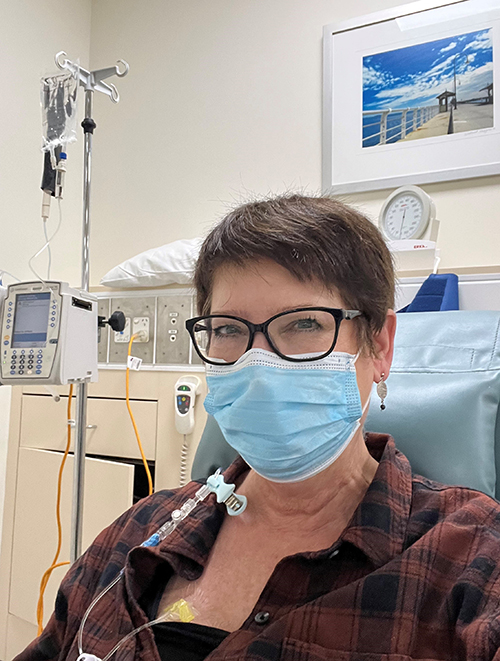Personalised cancer care: Becky’s journey with genomic sequencing at Cabrini
12/09/2024

In the face of a rare and aggressive cancer diagnosis, Becky, a vibrant woman in her mid-60s, found hope through cutting-edge genomic sequencing at Cabrini. Her story exemplifies the life-changing potential of precision medicine, soon to be more accessible to Victorians thanks to a landmark $10 million donation.
Becky’s journey began in 2022 when a routine check-up revealed a large uterine polyp. What seemed like a standard procedure took a dramatic turn when the biopsy results came back. “It turned out that a lot of the polyp was actually a malignant tumour of endometrial cancer,” Becky recalls. “And it was a rare type, only about 10% of endometrial cancers are the type that I had.”
Despite undergoing a radical hysterectomy and radiation treatment, Becky faced a shocking setback in early 2024. A persistent cough led to the discovery of large tumours in both lungs, indicating metastatic cancer.
The Power of Genomic Sequencing
Faced with this situation, Becky’s oncologist, Professor Gary Richardson OAM, Group Director of Cabrini Research, turned to advanced genomic testing. “They sent away a lot of blood for genomic testing,” Becky explains. “Meanwhile, they started me on a pretty standard type of chemo that would have suited breast cancer and endometrial cancer.”
The genomic sequencing process involved analysing hundreds of genes from Becky’s blood and tissue samples. While the process didn’t yield as many targetable mutations as hoped, it revealed a crucial piece of information.
“They did identify that my tumour cells were strongly HER2-positive,” Becky says. “That’s a protein on the tumour cells that they can target, and it’s also very prevalent in a lot of breast cancer patients.”
Targeted Therapy: A New Hope
This discovery led to a tailored treatment plan combining standard chemotherapy with HER2-targeted therapy. “Part of my chemotherapy, well, it’s not a chemotherapy drug, they call it targeted therapy. It’s two monoclonal antibodies that are targeting the HER2 protein,” Becky explains.
For Becky, this personalised approach has offered some positive news in the face of a typically poor prognosis. “When you have advanced cancer or metastatic cancer like I have, you really do want some form of targeted therapy,” she emphasises.
The Future of Cancer Care in Victoria
Becky is an example of the type of patient who will benefit from the forthcoming expansion of Cabrini’s genomic testing capabilities for up to 2,000 additional patients annually. This generous $10 million gift will establish a cutting-edge genomic testing program, aiming to provide personalised, precision treatment.
Professor Richardson, who will lead this initiative, explains: “Through broader, more comprehensive genomic testing panels, our clinicians will be able to precisely identify and target the unique genetic drivers of each patient’s cancer – a crucial step in delivering the most effective, tailored care.”
The new program is expected to significantly reduce waiting times for genomic test results and make this vital service more accessible to Victorians, including public patients who may have previously been unable to afford such specialised testing.
For Becky, the value of genomic sequencing in cancer treatment is clear. “I don’t know why anyone that has access to this kind of testing would not do it, when targeted treatments could mean that you have the opportunity to spend more time with your family and friends.”
As Cabrini and Monash University embark on this groundbreaking initiative, stories like Becky’s highlight the transformative potential of precision medicine in cancer care. With expanded access to genomic testing, more Victorians will have the opportunity to benefit from personalised treatments, offering new hope in the fight against cancer.